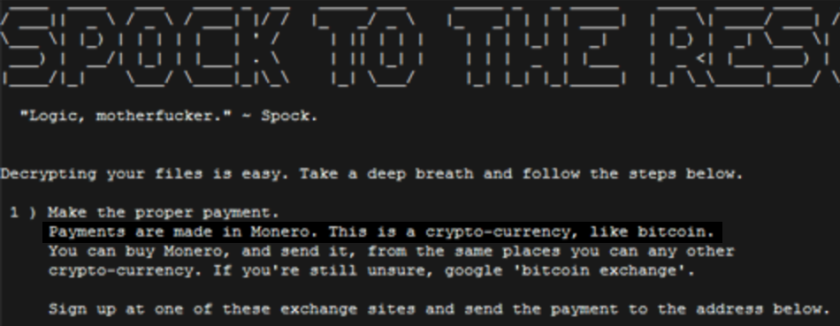Last month a new ransomware emerged known as “Kirk Ransomware.” The malware was interesting not just because of the Star Trek-themed imagery of James Kirk and Spock that it used, but also because it may be the first ransomware to demand payment via the cryptocurrency Monero.

There are literally hundreds of different types of existing cryptocurrencies like Monero that cybercriminals can choose from, but bitcoin is the most well known and has been the most widely used, by far, when it comes to ransomware. Bitcoin’s status as the reigning cryptocurrency king has been driven, in part, by the growth of cybercriminal markets and ransomware actors that greatly benefit by having a semi-anonymous payment option available. However, bitcoin is facing both growing pains and an expanding group of credible challengers that claim to have better answers to some of the current issues facing cryptocurrencies.
Cryptocurrencies are, for better or worse, intertwined with cybercrime, and dark web markets and malicious actors adopting new forms of payment such as Monero and Ethereum are helping push those currencies to new heights. With that growth comes new opportunities for cybercriminals as well as new concerns for law enforcement.
As we noted in a recent blog on AlphaBay’s plans to adopt Ethereum next month, the cryptocurrency has seen a dramatic increase in price on the heels of AlphaBay’s announcement and partnerships with legitimate financial institutions. Likewise, Monero was worth around $2.50 the day before AlphaBay announced plans to adopt the currency, and less than eight months later it has jumped to more than $26.
In December 2016 an AlphaBay support representative told Bitcoin Magazine that Monero accounted for about two percent of its sales, so bitcoin remains king. However, one can assume that the actors behind AlphaBay have plenty to gain financially by riding the wave created by the largest dark web marketplace adopting new cryptocurrencies — besides simply appeasing their customers.
Monero — which advertises itself as a “secure, private, untraceable currency” — is perhaps the most praised among cybercriminals. Bitcoin was not designed to be anonymous, and every transaction is publicly visible on the distributed ledger known as the blockchain. That’s why malicious actors use third-party tools such as bitcoin tumblers to help hide the origins of bitcoins. It’s also why law enforcement officials and security researchers have been able to “follow” bitcoins to bust those buying and selling illicit goods and services.
Monero, on the other hand, allows users to send and receive funds without transactions being publicly visible on the blockchain, which is one of the reasons some malicious actors prefer it.
“Bitcoin is much more vulnerable to chain analysis,” advised one AlphaBay member in September 2016, when the dark web market adopted Monero. “I can’t stress strongly enough how much more secure it is for darknet transactions.”

Although cryptocurrencies such as Monero have not been as heavily scrutinized by law enforcement as the more popular bitcoin, their adoption among malicious actors is a concern — even if Monero is not perfect.
“There are obviously going to be issues if some of the more difficult to work with cryptocurrencies become popular,” Joseph Battaglia, a special agent working at the FBI’s Cyber Division in New York City, said at an event in January. “Monero is one that comes to mind, where it’s not very obvious what the transaction path is or what the actual value of the transaction is except to the end users.”
As a case in point, the dark web marketplace known as Oasis, which beat AlphaBay by two weeks to become the first market to accept Monero, suddenly went offline in late September 2016 in what may have been an exit scam. Various users quickly reported that at least 150 bitcoin was lost in the potential scam, but guessing how much Monero currency was stolen proved to be much more difficult.
“If we can’t find out, that’s a good thing,” wrote one redditor.
However, the FBI likely has a different view.
